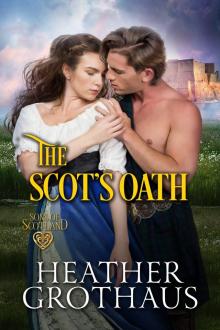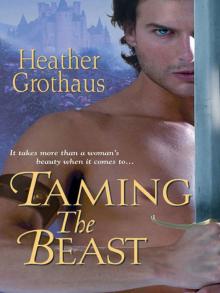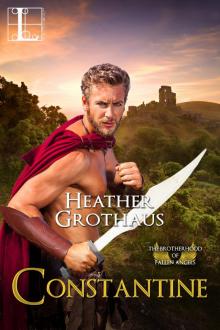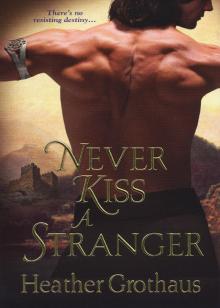- Home
- Heather Grothaus
Constantine Page 3
Constantine Read online
Page 3
“There is a ship at the docks, leaving tonight. In only hours,” he said with urgency. “You must see its journey to the end. Up the Danube to the town of Melk, where there is an abbey. Give this to the abbot there—Victor. Tell him who you are and what has been done to you. If there is any help to be had for you . . .” He broke off again, and Theodora felt him peel away one of her hands and then press a small disk-shaped object into it. “There is a sack of some of your belongings and what coin I could spare inside the carriage.”
Dori went very still, feeling the warm, round disk in her hand, like a little ember compared to the cold, wet spring air blasting past her heavy skirts but not moving them, sticking together and to her legs as they were wet with congealing blood. Simon wanted her to go away. He wanted to forget she existed. Of course he did. Likely he hoped she’d die before reaching whatever made-up destination of which he spoke.
The priest continued. “If you do as I say, there may still be hope for you and your child.”
“But not for you,” Theodora whispered, feeling a strange vibration coming from the road through the soles of her heretofore numb feet, frozen in her thin, sticky slippers. It was like a thread of lightning coursing through her, and she felt strength spreading to her legs, her spine, her arms, her heart.
She realized then that it was not lightning sizzling through her body but a fiery rage, rousing her fully from her torpor at last. And Dori welcomed it.
“You will burn in hell for this,” she continued in a low voice, hardly noticing that it had lost most of its rasp.
“Perhaps,” the priest acquiesced, and there was a tremble to the word when it passed his lips.
“You may as well go tonight.” Theodora raised both hands and shoved Simon with a sudden burst of furious energy, sending the priest backward down the rocky embankment past the edge of the road. His body disappeared into the darkness, taking his echoing shouts of surprise and pain with him.
She stood there swaying drunkenly on her feet, relishing for a cold moment the thought of the priest’s bones being broken and snapped, his head crushed on the stones below. But then she remembered she was not alone on the road and turned her head as quickly as her flagging strength would allow to find the servant boy. He stared back at her apathetically.
“You would attack me now, I suppose?” she asked with as much bravado as she could muster, her fire having burned out quickly. He seemed to be perhaps ten years of age, but stocky, likely from the physical exertion placed upon him by the menial labor he performed. Dori knew he could easily overtake her at that moment.
But the boy shook his blond head before looking toward the edge of the cliff where Simon had disappeared. “No, milady. I’ll fetch Father back up to the road if I can and take him back to the house.” He met her eyes again.
Theodora frowned, but she would not let the boy take advantage of her weakened state. She could afford no sympathy for any child save her own. “What will you tell them when you return?”
He looked back at the embankment, as if so disgusted either by her actions or her appearance that he couldn’t long stand the sight of her. “That a woman tried to kill Father Simon. That she left in a carriage for a ship.”
“You little spy,” Dori accused. “You would betray me even knowing the evil that has been done to me?”
He shrugged, still avoiding her gaze. “I’m not a spy. If I’m turned out, I’ve nowhere to go.” He glanced at the carriage. “You should go yourself, if you would. Before the driver comes inquiring. He expects only one of us to disembark at the docks any matter.”
Theodora’s hand raised from her side before she knew she was moving it, her fingers pinching the edge of the coin given to her by the priest as if it were an odious thing. “Here,” she said curtly. “Perhaps this will change your mind about what you saw tonight. Use it to buy food or something.”
The boy opened his palm and accepted the gold, only now daring to glance into Dori’s face. “Are you certain, milady? Father said this is the only way you—”
“I trust nothing that viper said. I certainly am not getting into a carriage bound for who knows where so that someone with marginally fewer morals can do the job he was too much of a coward to complete.” Besides, the mere thought of getting back into that rocking conveyance made her feel like vomiting again. “You must only tell me: In which direction is Thurston Hold?”
But the boy was now staring at the carriage as if mesmerized.
“Which direction?”
He blinked and then turned to point behind Dori, away from the rear of the carriage and down the dark road that disappeared into the black of the night.
If they had been on the way to the docks, she must be standing on the old Roman road to Chatham. Dori looked all around her, and then up into the clear, cold sky, feeling for any clue as to how far away she was from her home. But she may as well have been stranded in a foreign land rather than standing beneath the sky that had sheltered her since the moment of her birth. The stars seemed to be turning slowly above her, the black bowl of sky rotating as if balanced on a spindle....
The faint moaning of the priest from the abyss near the road startled her back to her predicament. He wasn’t dead after all.
Theodora began limping toward Thurston Hold, her steps mincing, dragging, gentle. She paused when she heard the carriage door open and turned in time to see the boy calling up to the driver as he stood on the threshold of the opening.
“We’re off,” he said. “Don’t stop until you reach the ship. The passenger will see himself disembarked.” He turned his head to look at Dori as the carriage began rolling away into the darkness. “My thanks for the coin, mistress,” he called past his cupped hand. “I hope you get your baby back. A boy needs a mother, even if she’s not a good one.”
“I am!” she tried to call after him angrily, but her voice had given out again, allowing only a creaky rasp to escape her throat. The carriage disappeared into the black, its jingle and rumble already fading. “I am a good mother,” she croaked, and now the wetness that came from her eyes welled from the sorrow she was still trying so desperately to suppress. “I would be. I will be.”
“Help me, boy,” Father Simon called out from beyond the cusp of the road, his voice breaking as if he struggled physically. “My arm—I think it’s broken. Boy? Boy, are you there?”
In an instant, Dori’s despair turned into a hard pebble of determination, dropped from the night sky into the storm-tossed sea of her broken heart, endless glittering, concentric ripples of rage radiating from it. She glared toward the chasm, feeling heat pour from her eyes as surely as any rays of light from the sun that would not shine for hours and hours on this cold, dark road.
Perhaps, for Dori, it would never shine again.
She began backing away down the road once more, ignoring the pulling in her abdomen, the freshened wetness on her thighs, the void that consumed not only her body but also her soul.
Theodora Rosemont would get her son back, no matter what she had to do. And she would see those who helped take him from her—who stole her very life—pay dearly.
Especially her husband, Glayer Felsteppe.
Chapter 2
Constantine left the road some distance before the village, choosing instead to navigate the steeply rounded hill on the edge of the wood, slick with new grass and dewy in the setting sun. April had turned the land to green velvet, and the familiar smell of the heavy, cool air teased his nostrils and twisted his heart. He’d sold the black horse upon which he’d ridden away from Melk long ago, but he was glad he wasn’t now sitting up high on a mount, forced to look around and ahead at what was one of the largest and wealthiest estates south of London, gazing out across Kent toward the sea.
He was glad, because the breeze carried no sounds of busy planting, no rumble of cart wheels on the road or jingle of harness in a frantic, last-minute rush to get in another quarter hour’s work before the sun set. Nay, the squares of fields around Bennin
gsgate lay tousled and wild with many winters’ growth. There was no one left to plant for, and so those who planted had gone. Most of them any matter; as Constantine hitched around the mound of the village he heard the occasional bark of a lonely dog, the shout of a woman calling someone to supper. He wondered for a moment if he knew any of the stragglers who had remained in the village, but then he decided it didn’t really matter. He wasn’t anyone’s lord anymore. He wasn’t anyone at all. He kept his gaze downward, his rough hood pulled over his head, delaying the first sight of what was left of his home for as long as possible.
His boots seemed to find their way back around to the road on the far side of the village on their own, and soon Constantine walked in the grassy ruts where once hard-packed earth had marked the way to the castle. No carts or riders came beyond the village now. There was no reason to. And so the road was little more than shallow, parallel ditches up the slope. It would curve to the right soon—yes, just here. His feet followed the path, his legs marched in a steady rhythm, his breath hissed and shushed in and out of his nostrils. The sun setting through the blooming trees to his left cast a crackle of black shadows across his route, as if the land had been broken, shattered.
Just like Constantine’s heart, his life.
It was four months since he’d left Melk in the night. Four months without the three men who had become like brothers to him at his side. Not an evening passed that he didn’t think of Roman Berg and pray for his safe return from the Holy Land. Constantine had heard no rumors on his journey of the king of Jerusalem’s murder, and so he hoped the huge stonemason had not sacrificed his own life to save Baldwin.
He thought of Adrian and was glad for the softening of his heart upon marrying Maisie. He wondered if Aid was still content at the abbey, with his duties and his studies.
He thought of Valentine and pondered how long the wily Spaniard would withstand such a mundane life, even with the beautiful Lady Mary and little Valentina to think of. Piracy ran in his blood after all.
God, he missed them all so much. They had become like family when he had still thought to one day return to his own wife and son. And then they had become his only family, because Patrice and Christian were dead.
His feet seemed to stop of their own accord as the ditches flattened and the new grass now poked up through gravel. Constantine stared at it, noticing with fear and dread how the wide apron of the approach to the castle was no longer comprised of only round, gray stone but interspersed with jagged pieces of honey-colored rock, many of the shards charred at their edges. That rock had been carted in from the north more than a hundred years before specifically to construct the tall, square keep Constantine might see if he would only look up. But he couldn’t—not yet.
All the bits of rock were pushed down level with the firm mud, trampled by so many feet—feet fleeing Benningsgate that fateful night? Looters going to and fro on the road after the tragedy?
The fantasy of seeing his son running to greet him on this very road upon his homecoming had been the only thing that had kept Constantine sane those years he served King Baldwin at Chastellet, and then after the siege, during his imprisonment and torture in Saladin’s dungeon. Had mourners walked this road in funeral procession with the bodies of his wife and son? How long had it been since Christian’s little feet had traveled over—
His vision blurred and Constantine crouched down. He swiped at his nose with the back of his hand while he sniffed and then reached out to pry one of the smooth pieces of fine gravel from the mud. He picked the little blades of grass from it, turned it before his eyes and then dropped it into his left palm to roll it around. He swallowed hard as his fingers closed over it, and Constantine at last raised his eyes.
He gasped through his nose even as a strangled whimper escaped his chest. Constantine wobbled on the balls of his feet and then threw his hands behind him as he fell backward on the road, as if the sight before him had reached out with malevolent fingers and shoved him. His satchel slid from his shoulder as he caught himself, its mundane contents clanging loudly in offense.
The keep was no longer a slim, four-cornered tower reaching high into the sky but a thin, jagged triangle of stone. The honey-colored rock was now lashed with black—the remnants of the fire that had consumed Benningsgate—and the once sweet shade glowed scar red in the dying rays of the sun. The wide arch of the entry to the barbican was barely visible behind the piled rock that had fallen from the wall higher up the slope and around the keep, and Constantine could see that the tunnel itself had mostly collapsed. It looked as though the top of the keep had exploded, and he wondered with horror how hot the interior of the dwelling had been to have destroyed walls eleven feet thick at their bases.
A solitary opening remained in the sliver of keep, and he knew by its telltale arch that it was the east window of the great hall, looking out over the wall walk leading around the enclosure on the sloping side of the grounds. The grandest hall south of the king’s home, once. Plastered and muraled. If Constantine closed his eyes, he could see the feasts they’d held in that hall; could hear the music wafting up to swirl around the beams in the high ceiling.
Now there was no ceiling, no floor. Nothing to look over from the east window save crumbled walls and sturdy weeds that were quickly becoming trees, nothing to hear save the birdsong surrounding what was left of Benningsgate Castle.
Christian was dead. He had died here. In the one place under heaven that he was supposed to be safe. Each beat of Constantine’s heart was a stabbing pain in his chest and the sobs bubbled up from the wellspring of misery that was his soul to shake his physical body.
“My boy,” he whispered through gritted teeth, squeezing his eyes shut and raising his face to the sky. His hood fell back and he felt hot tears track into his hairline above his ears. His inhalation was a jagged gasp. “My boy.”
Constantine sat up on the overgrown road, raising both knees and laying his forearms atop them. He buried his face in the worn, poor sleeves of the only tunic he now owned and wept.
* * *
Dori watched the man sitting on the road below for a very long time, wondering what he was doing at the ruin, who he was, what he was hoping to find. He was a poor man, as evidenced by his rough, drab clothing and his lack of a mount. His tunic was long-sleeved and came to his knees, belted around his waist. His boots appeared to be leather, though, and he wore a hooded cape. She assumed he was a foreigner by the manner in which he wore his hair—in a long, burnished plait that now dangled over his shoulder. He appeared to be resting with his head on his knees, but Dori had heard his sobs.
Perhaps the man had heard of the great estate of Benningsgate and had traveled here hoping for work. Perhaps he had sacrificed every penny he had, left behind loved ones, traveled who knew how far and for how long to come to this place only to find a charred ruin. Even the village was largely abandoned. Surely he had noticed the obvious state of the castle before he came so close.
But Dori understood better than most the manner in which people often sought to fool themselves.
He didn’t appear to be an enforcer of the king, or anyone employed by Glayer Felsteppe, although he wore a sword on his belt. Probably home-forged and worth little, she thought. Even a large-framed man such as he could be easily overtaken by a group, and he would be weary and weakened from his travels. He likely posed little danger to her, but she couldn’t let him out of her sight until she knew in which direction he would depart. She expected him to return by way of the village to beg shelter and food, now that he saw the ruin was deserted.
Well, deserted save for Theodora Rosemont.
Her foot slid the tiniest bit on the silty walk, sending a tinkling of sand and small pebbles down the side of the wall. Dori froze against the battlement, fearing the man would look up and notice the slightest movement in this place of still death, but he didn’t so much as twitch. She exhaled slowly, silently, as she continued to watch his bowed form.
The man raise
d his head from his forearms at last, but he continued to stare at the level of the barbican gate, as if mesmerized by something there. The evening cold was beginning to affect Theodora now, standing as still as she had been, and her back ached. Yet the strange traveler remained seated on the road. Perhaps he was scarred or obviously deranged. She wouldn’t know unless she got closer.
Dori eased herself away from the merlon on silent feet, backing away slowly until she felt the corner of the keep behind her. Then she turned and tiptoed carefully down the set of leaning stone steps that led to the main ward, throwing out her arms for balance, her eyes straining in the growing dusk to make out the gaping chasm where the stairs had pulled away from the keep.
She turned again as she stepped onto the wet grass, the calf-high vegetation tickling her cold, bare skin above her slippers and raising gooseflesh on her legs. She traversed the slope of the ward quickly, descending to the level of the barbican and slipping behind the slide of fallen rock into the narrow space left in the tunnel. Once she reached the barricade of collapsed stone, she hitched her skirts with one hand and reached up with the other, finding her handholds easily in the darkness of the passageway and climbing from memory toward the slivered arch of dusk near the top. From that vantage point, she should be just above the man on the road.
She inched her head slowly above the topmost crumbled stone and looked through the archway.
The road was empty.
Dori’s heart froze in her chest and her spine stiffened. For a moment she was unable to move at all, unable even to breathe. There was a stranger about Benningsgate and now she didn’t know where he was. Perhaps he’d risen and turned on the road to head back to the village. But perhaps not. And if he found her here alone . . .
Her courage returned to her in a rush and she quickly scrambled back down the pile of the collapsed tunnel ceiling. By the time her slippers touched down on the littered ground, she had freed the little knife from one side of her belt and checked the other for the presence of her larger weapon. The she turned in the darkness, her eyes scanning the shadows of the ward beyond the sloping pile of rubble of the fallen wall. She saw nothing but crept forward in the narrow, treacherous space, rolling heel to toe silently, listening until her ears ached.

 The Highlander's Promise
The Highlander's Promise The Laird's Vow
The Laird's Vow The Scot's Oath
The Scot's Oath Taming The Beast
Taming The Beast Never Seduce A Scoundrel
Never Seduce A Scoundrel Roman
Roman Never Love a Lord
Never Love a Lord Never Love a Lord (Foxe Sisters)
Never Love a Lord (Foxe Sisters) Valentine
Valentine Adrian
Adrian Constantine
Constantine Never Kiss A Stranger
Never Kiss A Stranger